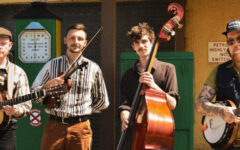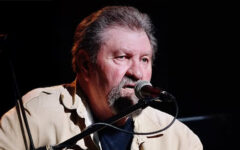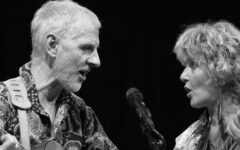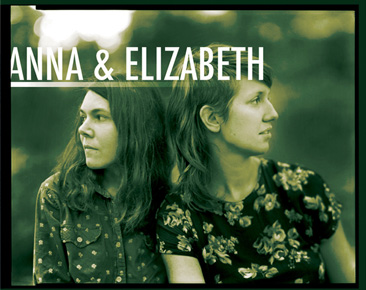
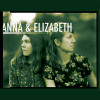 It’s often difficult for artists who play roots music to bridge the gap between traditional and modern styles in a convincing way. If they venture too far from established convention, they sound contrived; if they stick too closely to it, they become a novelty act. So it’s quite a challenge for musicians in the trad game to bring something original to the table and stay true to the music at the same time. Yet this past February at the Folk Alliance Conference in Kansas City I watched a Virginia duo, Anna & Elizabeth, make it look easy; that is, mix the ancient tones with contemporary élan in a natural way.
It’s often difficult for artists who play roots music to bridge the gap between traditional and modern styles in a convincing way. If they venture too far from established convention, they sound contrived; if they stick too closely to it, they become a novelty act. So it’s quite a challenge for musicians in the trad game to bring something original to the table and stay true to the music at the same time. Yet this past February at the Folk Alliance Conference in Kansas City I watched a Virginia duo, Anna & Elizabeth, make it look easy; that is, mix the ancient tones with contemporary élan in a natural way.
On their latest album, Anna & Elizabeth, Anna Roberts-Gevalt and Elizabeth LaPrelle deliver sixteen story-songs performed about as purely, perfectly, and forward-thinking as can be and do a bang-up job of being their true selves inside the Appalachian ballad tradition. Their amalgamation of past and present sensibilities is so spry, it’s not hyperbole to say that this record could be spun at the grand opening of a raw denim boutique in NoLIta or at a dance in a Kentucky holler circa 1922 and please each crowd just the same.
One of the most enchanting features of the album is the way in which the duo eschews predictable old-time motifs and shepherds the listener into their world by way of plucky arrangements and delicate harmonies. But perhaps the most captivating aspect of the record is how Roberts-Gevalt and LaPrelle put a fresh spin on the old songs simply by being who they are – 21st century women. A verse sung by an old man in an ancient field recording becomes something quite different when these two deliver it. Here, a former tale of hardship might sound like an admonition or a declaration of independence, while an erstwhile expression of joy might end up feeling like a lamentation or even a plea.
“I think in general when you’re a woman playing this music there’s a ton of lyrics that you’re just like, ‘Huh? Don’t really know what to make of this,’” Roberts-Gevalt explains sitting down for a chat with Bluegrass Today. “You’re right about what those words sound like coming from two young women. They take on a different meaning.”
It’s a slight yet subversive paradigm shift that occurs in a few spots on the album and it brings an additional layer of depth to the tunes. That said, Anna & Elizabeth is far more than a collection of reconditioned cover songs. The articulation of pathos on the record makes for an enlightening listening experience where these two latter-day balladeers prove to be as thoroughly tuned in to the soul of the music as any of the old masters who sang these stories way back when.
Listening to the record, the first thing that hits you is the arrangements, some of them are risky and not so traditional. And vocally there’s some complex interplay between you and Elizabeth. Is everything planned to the note or do you leave room for improvisation?
Our music is rooted in an approach we learned from playing old-time music, which is about feel. We hear a song and figure out what kind of feel we want, then within that framework a lot is improvised. We don’t do a ton of planning. Old-time music has really given us an aesthetic of simplicity. That’s where the Greenwood Sidey arrangement came from. That idea of, “What if we just play one note?”
That’s not a traditional arrangement at all but it really fits the narrative in the song.
I was thinking about Steve Reich and the similarities I hear between his work and this music, and using that same, droney rhythm over and over to create a simple framework with a complex story on top of it. We think of arranging as creating platforms and then we put the lyrics on top of them. But because we’re so narratively driven, we might actually talk about the meaning of a song more than we rehearse the singing of it to figure out how we feel about what’s happening in the story. And that somehow goes into our arrangements.
Do you feel any pull to stay true to the “classic” versions of some of the songs you cover? Ever think you might be messing with something sacred when you arrange them so unconventionally?
I think in some ways we’ve avoided that issue. We’ve done a lot of work trying to learn music from field recordings as a way to not get bogged down in more recent old-time recordings. If you’re learning from a field recording you only have one voice that you learned the song from and it’s not really giving you any harmonic or rhythmic information. That gives us a lot of leeway to say, “Well, how do we hear it?” Versus if we recorded another version of Willow Garden where I would ask, “How can we do it differently without being too annoyingly different on purpose?” [Laughs]
So then is it difficult balancing your creative impulses with staying true to the music? How do you bring something original to it without being, as you just said, “too annoyingly different?”
As a pair we really value the relationships we have with some of the families of the singers who we draw a lot from. It’s important to know that we have their support. Like with Texas Gladden, it means a lot to us that her family is excited that we’re carrying on her music. And weirdly, they help us be ourselves in her music. Because who better to know that we’re not Texas Gladden than Texas Gladden’s granddaughter? She’s not expecting us to sound like her granny. I don’t think we feel as though we have to please her with all of our arrangements because she trusts us, and the interpretation is an understood part of what we’re gonna do. I think that’s part of how we’ve found our own voice. Also, I think that learning from the sources has given me confidence to be my own musician. Because you realize that all these old characters you hear in recordings, they were authentic versions of themselves. They created music that sounded like them. They weren’t creating music that sounded like their whole town. And then being inspired by those musicians who were great listeners, who let everything into their ears. I often go to improvised music shows and new music shows, and that comes into my ears, and ballads come into my ears and then, without trying too hard when I make my own music, it’s influenced by all that.
For newcomers to this music, they generally need a way into it. And it’s players like you who’ll be their gateway drug so to speak. How do you bring them in and get them interested?
The coolest thing we do in our travels is plant the spark of, “You can learn this too!” I mean I’m here because of a series of gateway drugs [Laughs]. We talk a lot about reaching people who don’t already know they like banjos. We take stagecraft really seriously because it’s a crazy challenge to explain to someone how moving a little song is. This is subtle music and I think you have to figure out how to invite people into that space where they can hear it. How do you do that in a way that feels musically true to us, but that might not be the most high-drama-hit-you-over-the-head? We rely a lot on storytelling techniques and creating a whole show that can put the music in context. Because I think the context is what makes it magical.
Could you elaborate on that, why you think this music in particular needs context?
A lot of these songs were songs that people would hear often in their lives. Especially the ballads. I doubt that ballads were written for a first time listener. I imagine if my grandma was a ballad singer I probably would have heard her sing a song when I was really little. Then by the time I was thirteen I would think, “Oh, that’s what’s happening in that story.” Then as an adult, after living some of these things, I’d be like, “Oh, thaaaaaat’s what’s happening!” [Laughs] You’ve heard Cinderella a million times but you don’t really remember the first time you heard it. It just exists. When we’re performing a ballad we’re trying to use a song to do something it’s never had to do, which is to convey the story in one singing. Sometimes we ask our audience, “Raise your hand if you can remember when someone taught you Happy Birthday.” And no one raises their hand obviously because no one remembers. That’s what a lot of these songs used to be like for people. They just existed because you grew up hearing them.
If only it could be like that again.
I know!

